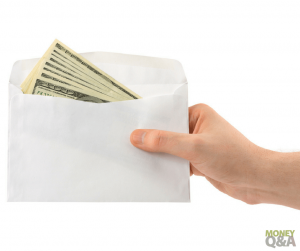This post may contain affiliate links, and I will be compensated if you make a purchase after clicking on my links.

A new report from the Federal Reserve found that, as of June 2017, the amount of outstanding credit card debt in the United States is at the highest level it has ever reached in the country’s history. The previous record was set in April 2008 – just before the recession – but now that the economy has vastly improved, why is there so much credit card debt in the U.S.?
Some economists have argued the ease of access to credit cards has led to our personal debts spiraling out of control. After all, the flashy advertisements for 0% introductory APRs and incredible rewards of 1.5% (or more) cash-back on purchases are too good to ignore. If you’ve witnessed some of the warning signs of too much credit card debt in your own life, then switching to a cash-only budgeting strategy (or significantly reducing your credit card usage) could be a viable option.
How to Create a Cash Only Budget
Maybe switching to a cash-only budget is the right decision for you and your family. Here’s why and how you should consider budgeting with cash online:
Psychological Benefits of Using Cash
According to psychological research on spending habits, using credit cards can be risky for consumers because they disconnect the pleasure of buying from the pain of paying. In other words, you don’t feel like you’re spending your hard-earned money when you simply swipe or insert your credit card while out shopping (“Of course I’ll pay this off after my next statement!”).
But, cash forces you to visually acknowledge how much you’re really spending when you pull it out of your wallet, count it up, and give it to the cashier. Using a credit card and knowing you can just pay off that purchase later is a procrastinator’s dream, but a frugal shopper’s nightmare.
According to @MIT research, using credit cards is dangerous for consumers because disconnects the pleasure of buying from the pain of paying. Click To TweetPsychological studies have also linked credit cards to more impulsive, emotional spending and high credit limits trick consumers into thinking their purchases are relatively cheap because why worry about a $7 cold brew purchase when your credit limit is $6,000?
Other psychological experiments have found credit card users are willing to spend more money than cash users on the same item, probably due to the combination of perceived rewards (instant gratification of purchasing the item now instead of having to wait until you have enough money to pay for it in full) and delayed “pain” of paying (3-5 weeks from now instead of right then and there).
Hide the Credit Cards
If you decide to switch to a cash-only budgeting strategy (even if temporarily) then hiding your credit cards to prevent yourself from temptations to splurge is key to staying on track. You should never cancel your credit card altogether – at least not your oldest credit line because doing so could actually decrease your credit score. But, locking up or even cutting up your credit cards (you can request a replacement later) can help you avoid moments when your brain tells you, “Just this once!”
Alternatively, you could treat your credit cards like debit cards and commit yourself to never spending more than your current personal cash flow, even if you have an outrageously high credit limit that can accommodate bigger and more frequent purchases. While you could be more tempted to spend money when your credit cards are readily available, this alternative to the 100% cash budgeting approach is more efficient for paying bills and maintaining your auto-payments online without having to deal with snail mail.
An Envelope for Each Category in Your Budget

If you’ve done any reading on cash-only budgeting previously, then you probably know about Dave Ramsey’s Envelope System. In a nutshell, this system uses literal envelopes to store cash you’ve allocated for various categories in your budget.
So, if you have $400 per month budgeted for groceries and dining out, then you would put $400 in the envelope labeled “Groceries/Restaurants” (or $200 per paycheck, if you’re typically paid on a biweekly basis) and stop spending when the envelope runs out of cash (though obviously, you don’t want to starve, so it’s important to have an emergency savings fund and try to avoid dipping into that at all costs by sticking to your budget).
You can find Dave Ramsy’s envelope systems on Amazon to help get you started. The Starter Envelope System has all the tools that you need to begin Dave’s proven, easy-to-use cash management system. Try this simple way to manage your household income and expenses and avoid spending more than you earn
Keep Track of Expenses with Apps or Excel
The envelope budgeting system won’t work if you’re not keeping track of your expenses and have no idea how much money is left in your envelopes at any given point. While daily budgeting might be a bit excessive for most folks, weekly expense-tracking is enormously useful.
You can use a basic spreadsheet program like Microsoft Excel to organize your budget into simple categories alongside receipt records you input yourself into weekly columns. If you happen to lose a receipt a long the way, at least you can go back to your envelopes and see how much cash is left to calculate how much money you spent in the past week.
If you prefer more on-the-go budgeting, then apps like Mint, PocketGuard, or Mvelopes are perfect for smartphone users who want to streamline the budgeting process even while you’re away from your computer. Mobile budgeting apps offer one major advantage over Excel and handwritten budgets: you can input amounts from receipts immediately after making a purchase, so you don’t risk losing a receipt or forgetting to include it altogether in your weekly calculations.
Cash or Credit Budgeting: What’s Ultimately Right for You?
A cash-only budget can help you prioritize your expenses and limit instances of overspending compared to using credit cards to pay for everything. If you’re already extremely financially responsible and pay off your credit cards in full each month, then continuing with rewards credit cards could be an option, though you might still be overpaying for some items and services because the cash-back or miles rewards increase the perception that credit cards are a win-win for you (financially, maybe – psychologically, probably not).
However, if you’ve struggled with impulsive purchases before and you’re ready to make the switch to a cash-only lifestyle to limit your spending and build your savings, then this approach would be ideal for stabilizing your financial situation.
What about you? Have you tried sticking to a cash only budget? What was the hardest part for you?

